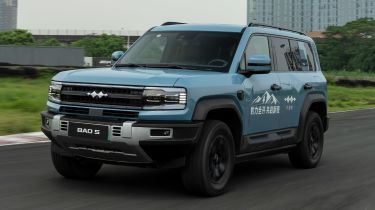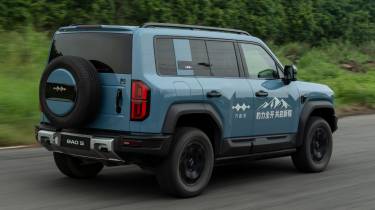New Fangchengbao 5 review: BYD's answer to the Land Rover Defender
Another intriguing model from the burgeoning BYD stable, the Fangchengbao looks to take on the Land Rover Defender
Verdict
There's still work to be done before the Fangchengbao 5 could really be considered a proper Land Rover Defender rival – even a more affordable one; we’re certainly curious to see where the car ends up once it has been treated to a set of sensible tyres and been through proper European-market calibration. But if BYD can polish the on-road behaviour and bring the car in at a keener price than a Defender P400e, there’s definitely potential for the 5 to find sales – not just from those after a spacious and nicely finished cabin, but also from customers attracted by what looks a competitive level of real-world pure-electric range.
BYD’s bid to conquer the world – well, Europe at least – is building further momentum. We know now that the company will aim to bring its cut-price EV, the Seagull, to Europe and the UK by the end of 2025, and now we’ve had an early chance to try a model from the other end of the spectrum that could pitch the Chinese giant against the likes of the Land Rover Defender: say hello to the Fangchengbao 5.
To put Fangchengbao in context, BYD itself is the mainstream brand of the company’s line-up. Next up is Denza, which has a more premium feel. Then comes Fangchengbao, mixing premium and luxury but positioned below YangWang, the marque responsible for the ludicrously over-the-top U8 SUV.
Used - available now

2024 BMW
2 Series Gran Coupe
14,188 milesAutomaticPetrol1.5L
Cash £21,300
2023 Mercedes
A-Class
18,642 milesAutomaticPetrol1.3L
Cash £19,562
2023 Audi
e-tron
27,551 milesAutomaticElectric
Cash £32,200
2021 Mercedes
AMG C43 Saloon
39,594 milesAutomaticPetrol3.0L
Cash £27,787The Fangchengbao 5 can’t match the U8 for road presence – frankly, not much can – but this is still an imposing creation. It measures almost 4.9 metres in length, has a body-on-frame chassis, and comes with a potent plug-in hybrid powertrain that mixes 1.5-litre turbocharged four-cylinder petrol power with a pair of electric motors (one on each axle) for four-wheel drive.
The total system output is a prodigious 677bhp, with 760Nm of torque; that’s more overall grunt than even the most potent V8 Land Rover Defender, and more than double the shove of Ford’s Ranger Raptor pick-up – another potential rival.
The powertrain, BYD’s off-road-focused DMO (Dual Mode Off-Road) Super Hybrid set-up, includes a 31.8kWh battery – a figure that would trump many first-generation pure-electric models here in Europe and the UK. It’s enough, BYD claims, for up to 125km (78 miles) of pure-electric range, albeit in China’s less strenuous test. A WLTP figure north of 45 miles should still be possible, though.
With Land Rover in mind, we’re not going to be able to test the Fangchengbao 5’s off-road credentials during this test; our first run comes at a (soaking-wet) Chinese race circuit. But as we clamber up into the vehicle, it’s immediately clear that this is a global model that could easily make it to Europe, if BYD chooses.
The exterior styling has enough off-road cues to evoke the spirit of the Defender or even a Toyota Land Cruiser. Inside, the cabin materials are well chosen, with a chunky, rugged feel and layout to the dashboard that you simply don’t get in any of the brand’s other models.
Visibility is good, with a steeply raked windscreen and squared-off corners that make it easy to judge where the 5 starts and stops. The dashboard itself is perhaps a little button heavy, but the switches are all of a sensible quality and everything feels solid – particularly the grab handles at either edge of the fascia and centre console. They can come in handy when you’re hauling yourself up into the front seats.
It’s soon evident that, much like the U8 that we tried in the UK a few months back, the Fangchengbao 5 does not feel as fast as its power figures suggest. You can flick a switch on the centre console to move between the pure-electric and hybrid modes, which lets the car decide when it needs to mix EV and petrol power. But even with this engaged, the acceleration doesn’t feel as impressive as the quoted sub-five-second 0-62mph time. It’s perhaps the first sign that we’re dealing here with a 4x4-focused vehicle, complete with a kerbweight that’s said to be around 2.9 tonnes.
Further, more conclusive evidence of this is delivered at the first corner of BYD’s test circuit, where the Fangchengbao 5 demonstrates instantly that it doesn’t like to be rushed. There’s a fair amount of pitch under braking and acceleration, and the soft suspension allows a considerable amount of body roll. In our case, the front tyres had long since given up by this point and were skating across the road surface, inducing pretty chronic understeer.
We need to insert a couple of caveats at this point, mind you: the racetrack chosen by BYD for our test was well used and had been freshly doused by a proper Asian downpour. The car was equipped with a relatively unknown tyre brand called Giti Xross, too; we suspect a decent set of Michelins or Continentals (both potential suppliers for European-spec editions, we’re told) would have given the Fangchengbao 5 much better bite on corner entry.
Other aspects are more positive. DMO Super Hybrid does a good job of masking the moments when it needs to flick between electric and petrol power, and the engine itself is smooth and relatively well isolated from the cabin.
Speaking of which, there’s plenty of room inside for five adults (the wheelbase, in a curious twist of fate, is less than a centimetre longer than a Defender 110’s), and while we’re still waiting for BYD to confirm precise capacities, the load bay looks large enough, with a flat load lip. The rear tailgate opens from the side, which isn’t the most practical layout – but it’s hardly a feature that’s held the Defender back from sales success, so it’s clearly a compromise that buyers of this type of vehicle are willing to accept.
| Model: | Fangchengbao 5 Navigation Edition |
| Price: | £70,000 (est) |
| Powertrain: | 1.5-litre 4cyl turbo PHEV, 2x e-motor |
| Transmission: | CVT automatic, four-wheel drive |
| Power/torque: | 677bhp/760Nm |
| 0-62mph: | 4.8 seconds |
| Top speed: | 112mph |
| Economy: | TBC |
| Emissions: | TBC |
| EV range: | 78 miles (Chinese test) |
| Size (W/L/H): | 4,890/1,970/1,920mm |
| On sale: | 2025 (TBC) |










